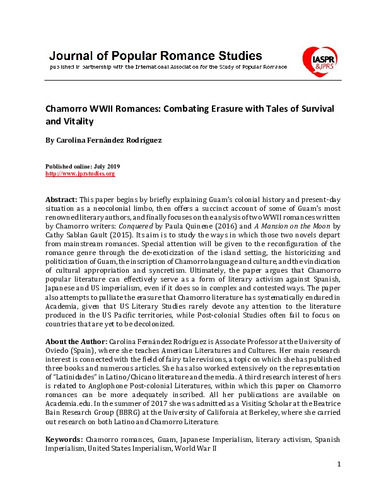Chamorro WWII Romances: Combating Erasure with Tales of Survival and Vitality
Author:
Subject:
Chamorro romances
Guam
Spanish, Japanese and US Imperialism
World War II
Publication date:
Editorial:
The International Association for the Study of Popular Romance
Descripción física:
Abstract:
This paper begins by briefly explaining Guam’s colonial history and present-day situation as a neocolonial limbo, then offers a succinct account of some of Guam’s most renowned literary authors, and finally focuses on the analysis of two WWII romances written by Chamorro writers: Conquered by Paula Quinene (2016) and A Mansion on the Moon by Cathy Sablan Gault (2015). Its aim is to study the ways in which those two novels depart from mainstream romances. Special attention will be given to the reconfiguration of the romance genre through the de-exoticization of the island setting, the historicizing and politicization of Guam, the inscription of Chamorro language and culture, and the vindication of cultural appropriation and syncretism. Ultimately, the paper argues that Chamorro popular literature can effectively serve as a form of literary activism against Spanish, Japanese and US imperialism, even if it does so in complex and contested ways. The paper also attempts to palliate the erasure that Chamorro literature has systematically endured in Academia, given that US Literary Studies rarely devote any attention to the literature produced in the US Pacific territories, while Post-colonial Studies often fail to focus on countries that are yet to be decolonized.
This paper begins by briefly explaining Guam’s colonial history and present-day situation as a neocolonial limbo, then offers a succinct account of some of Guam’s most renowned literary authors, and finally focuses on the analysis of two WWII romances written by Chamorro writers: Conquered by Paula Quinene (2016) and A Mansion on the Moon by Cathy Sablan Gault (2015). Its aim is to study the ways in which those two novels depart from mainstream romances. Special attention will be given to the reconfiguration of the romance genre through the de-exoticization of the island setting, the historicizing and politicization of Guam, the inscription of Chamorro language and culture, and the vindication of cultural appropriation and syncretism. Ultimately, the paper argues that Chamorro popular literature can effectively serve as a form of literary activism against Spanish, Japanese and US imperialism, even if it does so in complex and contested ways. The paper also attempts to palliate the erasure that Chamorro literature has systematically endured in Academia, given that US Literary Studies rarely devote any attention to the literature produced in the US Pacific territories, while Post-colonial Studies often fail to focus on countries that are yet to be decolonized.
ISSN:
Patrocinado por:
Project “The politics, aesthetics and marketing of literary formulae in popular women’s fiction:History, Exoticism and Romance,” supported by AEI/FEDER, UE (FFI2016-75130-P)
Collections
- Artículos [36307]
- Filología Inglesa, Francesa y Alemana [542]
- Investigaciones y Documentos OpenAIRE [7936]
Files in this item





